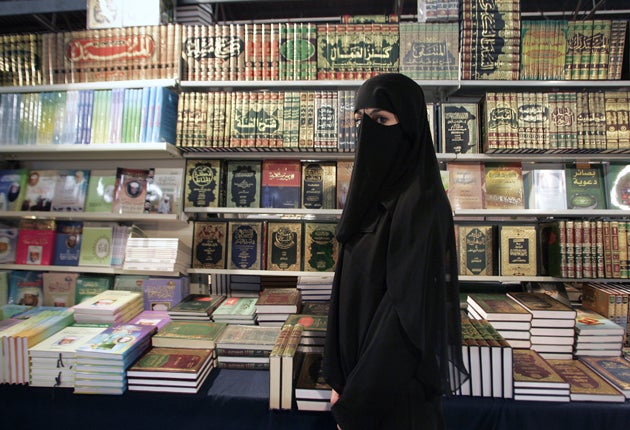France split over plan to outlaw burqa
Racial unrest feared over new law, which goes further than ban on headscarves

Your support helps us to tell the story
This election is still a dead heat, according to most polls. In a fight with such wafer-thin margins, we need reporters on the ground talking to the people Trump and Harris are courting. Your support allows us to keep sending journalists to the story.
The Independent is trusted by 27 million Americans from across the entire political spectrum every month. Unlike many other quality news outlets, we choose not to lock you out of our reporting and analysis with paywalls. But quality journalism must still be paid for.
Help us keep bring these critical stories to light. Your support makes all the difference.
A suggestion that the full-length veil, or burqa, might be outlawed in France split the French government down the middle yesterday.
The government's official spokesman, Luc Chatel, said that legislation might be introduced to ban full-length veils if it was proved that they were being "imposed" on Muslim women against their will.
However, the Immigration Minister, Eric Besson, said legal action would "create unnecessary and unwelcome tensions" and re-open the anguished dispute which surrounded the decision in 2004 to ban Islamic headscarves, and other religious symbols, from state schools in France.
President Nicolas Sarkozy, speaking after the EU summit in Brussels, said he would address the subject in public on Monday but warned against surrendering to "emotional" arguments.
Just like the headscarf debate, a dispute over the wearing of the full-length veil has scrambled the normal political boundaries between right and left and has divided France's 4 to 5 million-strong Muslim community. The debate was re-opened by, of all people, President Barack Obama, who said in his speech in Cairo last week that Western nations should not impede the practice of Islam within their frontiers.
This comment was endorsed by M. Sarkozy but criticised by some French politicians, of both right and left, as an attack on France's "headscarf law". André Gerin, a Communist MP who represents a poor, multiracial area in the suburbs of Lyons, tabled a motion this week calling for a commission of inquiry into what he said was an explosion in the number of women wearing full-length veils in France. He said that this was a "direct response" to President Obama's remarks.
At first, M. Gerin's proposal seemed likely to go nowhere but his action was praised on Thursday by Fadela Amara, a left-wing crusader for Muslim women's rights who joined the centre-right French government in 2007. Ms Amara, Minister for Urban Renewal, said she was "in favour of the total prohibition in France of the burqa ... this coffin which kills the fundamental rights of women."
She added: "You only have to go to certain markets, such as in the suburbs of Lyons, to see that there are more and more women wearing the burqa ... These are women who are the prey of oppression, from masculine domination to fundamentalistic Islamic indoctrination."
In a radio interview yesterday, M. Chatel said he supported the idea of an official inquiry. "If it emerged that the wearing of the burqa was imposed [on women], and therefore contrary to our Republican principles, parliament would naturally have to draw the appropriate conclusions."
Asked if this might mean a law, he said: "Why not?"
Such a law might be even more controversial than the head-scarf legislation of 2004. That law applied only to children and teachers in state schools and employees in public buildings. It banned not just head scarves but Catholic crucifixes and Jewish kippas. The suggested new law would ban the wearing of the full-length veil anywhere in public.
M. Besson, another left-wing politician who was persuaded by President Sarkozy to join his government, said a legal ban would be "ineffective" and counter-productive, stirring up racial and religious tensions and reinforcing a sense of persecution among some Muslim communities.
Subscribe to Independent Premium to bookmark this article
Want to bookmark your favourite articles and stories to read or reference later? Start your Independent Premium subscription today.
Join our commenting forum
Join thought-provoking conversations, follow other Independent readers and see their replies
Comments